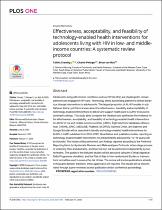Effectiveness, acceptability, and feasibility of technology-enabled health interventions for adolescents living with HIV in low- and middle income countries: A systematic review protocol
Abstract
Adolescents living with chronic conditions such as HIV (ALHIV) are challenged to remain adherent and engaged in HIV care. Technology offers a promising platform to deliver behaviour-change interventions to adolescents. The largest proportion of ALHIV resides in sub-Saharan Africa; yet little is known about the effectiveness, feasibility and acceptability of technology-enabled interventions to deliver and support health care to ALHIV in resource-constraint settings. This study aims to explore the literature and synthesise the evidence for the effectiveness, acceptability, and feasibility of technology-enabled health interventions for ALHIV in low and middle-income countries (LMIC). Eight electronic databases (Ebscohost, CINAHL, ERIC, MEDLINE, PubMed, SCOPUS, Science Direct, and Sabinet) and Google Scholar will be searched to identify technology-enabled health interventions for ALHIV in LMIC published from 2010–2022. Quantitative and qualitative studies reporting on technology-enabled health interventions for predominantly adolescents (10–19 years) will be included.

